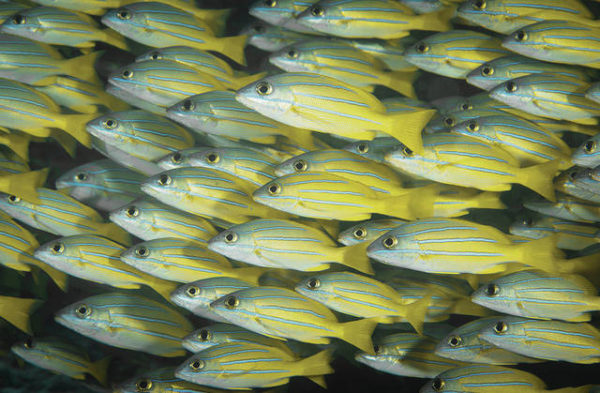Published in the Ocean Watch column, Honolulu Star-Advertiser © Susan Scott
December 15, 2018
Two readers emailed to correct my statement last week regarding the state’s rules on the killing of spiny lobsters. According to the latest Hawaii Fishing Regulations, published in March, it is illegal to kill any female spiny lobsters. Ever.
Thank you, Alan, for taking the time to photograph and send me Hawaii’s latest regulations.
 Blue-lined snappers, also known as taape,
Blue-lined snappers, also known as taape,
were introduced by state officials in 1958.
Courtesy Russell C. Gilbert
The other email — subject line “NO, NO, NO” — wrote that Hawaii’s statutes had been revised “because poachers would strip the eggs off, rendering females egg-less during inspection when only egg bearing females were protected.” The reader concluded by informing me that “misinformation is helping degrade our nearly destroyed marine ecosystem.”
I would add that deceit, greed and ignorance of reproductive biology might also be factors.
Another reader, Robert, wrote that someone told him Hawaii’s spiny lobsters are in decline because blue-striped snappers eat lobster larvae.
In 1958 the state introduced 2,431 of these reef fish, known by the Tahitian name taape, from the Marquesas as a possible commercial fish. The 15-inch-long fish never caught on as a food source here, but the pretty yellow snapper with blue stripes down its sides loved Hawaii waters and underwent a population explosion.
The species spread throughout the islands, ranging as far as Midway Atoll. Taape swim at depths of 6 to nearly 900 feet and are now common here.
Taape is considered a pest by anglers who believe the species has caused the decline of goatfish, deepwater snappers and other food fish. Researchers studying taape found that they eat both fish and crustaceans, but it is unknown whether they are the cause of the decline of the above fisheries.
One author, John Hoover, states, “Most likely the dwindling catches of goatfish and deepwater snappers (and I would add lobsters) are due to simple overfishing.”
Speaking of snappers, a reader emailed requesting my mailing address because his friend wanted to ask a question but doesn’t do computers. A few days later I received a nice handwritten letter from reader George A. Kam Jr. His question: Why do they call snappers snappers?
Online dictionaries say that the term snapper has been used for certain fish since the 1690s. Today most of the 192 species in the family Lutjanidae are called snappers.
I could find no source suggesting how this name got started, but my fish books offer a clue. Snappers are carnivores, many bearing large mouths full of sharp teeth. I imagine when anglers in the 1600s removed hooks from the mouths of these fish, they got their hands bitten and named the fish snappers.
Thank you, dear readers, for helping me get it right.